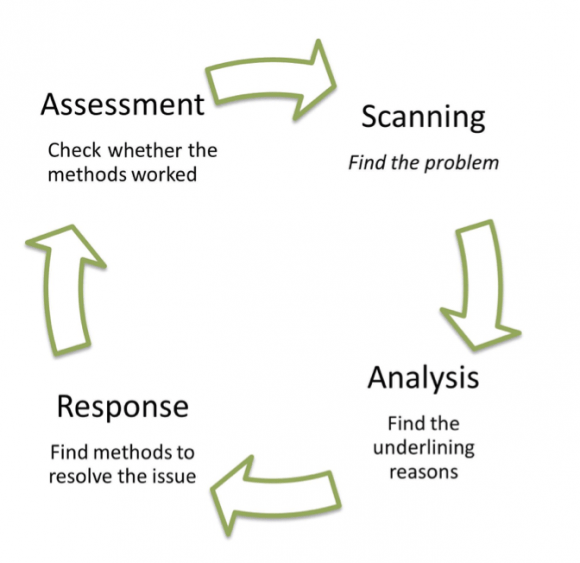It requires a commitment at the management level guidance and direction by supervisors and community engagement by line staff. Community policing is best characterized as a partnership.

Community Policing A Success Story Rise Of Community Policing
Community policing is best characterized as a partnership.

. A core component of problem-oriented policing is the employment of nontraditional interventions community-oriented policing is a conceptual framework for which the central tenet is community engagement a mission statement is the standard against which administrators evaluate all decisions and actions. Community policing is a philosophy that promotes organizational strategies that support the systematic use of partnerships and problem-solving techniques to proactively address the immediate conditions that give rise to public safety issues such as crime social disorder and fear of crime and satisfaction with police services. Contemporary policing Carter and Carter 2009 conceptualize ILP as.
While ILP is seldom characterized explicitly in light of the fact that it is intended to advance with progresses in. The operational strategy known as _______ seeks to reduce chronic offending in the community. It is a normal desirable and unavoidable part of policing.
A method used to screen out cases with a very low probability of being solved so that detectives can concentrate on more promising. Police serving the interest of politicians. C ommunity policing is not dead.
Community policing redefines the role of the public. It is formed as a result of cooperation between the police and the community. Community-oriented Policing is a conceptual framework for which the central tenet is.
Community-oriented policing and problem solving COPPS can be alive and well but needs a reboot to be successful in todays environment. Evidence-based For which of the following strategic conceptual models has quantitative research. Communi Oriented Policin COP aims to alter the relationship between officers and the community by replacing impersonal reactive traditional policing with the more personal proactive community oriented approach.
The reduction of crime can be accomplished by maintaining the physical condition of a neighborhood. The assortment and examination of data connected with crime and conditions that contribute. It is formed as a result of cooperation between the police and the community.
How does community policing differ from traditional policing. It is defined as the exercise of group choice or judgment concerning possible courses of action. Community-oriented Policing is both a philosophya way of.
The Concept of Intelligence-Led Policing. The political era of American policing 1840s to 1930s was characterized by. The existence of clear rules and laws makes discretion unnecessary but police dont want to give up the power.
It is formed as a result of cooperation between the police and the community. ______ policing is associated with enforcing the letter of the law and using little to no discretion in considering situational or contextual elements in infractions of the law. The premise of Community-oriented Policing is that police alone cannot control crime and disorder and promote residents quality of life.
A limitation of community policing is that there is little evidence that it enhances community processes in ways that would be expected to subsequently reduce fear disorder and crime. Case screening is __________. It is hardly ever used in policing.
Instead of playing a passive role citizens can partner with the police to improve neighborhood conditions. Community Engagement The 2010s will hopefully be characterized by the term. Zero tolerance Fighting against minor indicators of neighborhood decay and disorder such as graffiti and litter are strategies of those who buy in to which theory.
This new philosophy of policing cannot evolve without proper recruitment and training. Which of the following best describes community oriented policing. Focuses on fear reduction and order maintenance activities through the involvement of citizens using problem solving methods Sets with similar terms.
Problem-oriented policing changes the prime focus of the police away from incidents toward identifying understanding and solving problems. Community policing is best characterized as a partnership.

Community Policing Vs Traditional Policing Movementforward

Community Policing University Police Public Safety

What Is Community Policing Youtube

A Look Inside Strategies Contributing Towards Community Policing Sara Model Movementforward
0 Comments